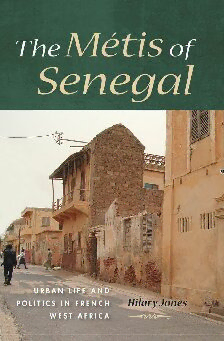
The Métis of Senegal: Urban Life and Politics in French West Africa PDF
Preview The Métis of Senegal: Urban Life and Politics in French West Africa
The Métis of Senegal The Métis of Senegal U R BA N L I FE A N D P O L I TI CS I N FREN CH W ES T A FR I C A Q Hilary Jones Indiana University Press Bloomington and Indianapolis This book is a publication of Library of Congress Cataloging-in- Indiana University Press Publication Data 601 North Morton Street Bloomington, Indiana 47404-3797 USA Jones, Hilary, [date] The métis of Senegal : urban life and poli- iupress.indiana.edu tics in French West Africa / Hilary Jones. pages cm. Telephone orders 800-842-6796 Includes bibliographical references and Fax orders 812-855-7931 index. ISBN 978-0-253-00673-8 (cloth : alkaline © 2013 by Hilary Jones paper) ISBN 978-0-253-00674-5 (pb : alkaline All rights reserved paper) ISBN 978-0-253-00705-6 (eb) No part of this book may be reproduced 1. Racially mixed people—Senegal— or utilized in any form or by any means, Saint-Louis—Social conditions—19th electronic or mechanical, including pho- century. 2. Sociology, Urban—Senegal— tocopying and recording, or by any infor- Saint-Louis. 3. Assimilation (Sociol- mation storage and retrieval system, with- ogy)—Senegal—Saint-Louis. 4. Elite out permission in writing from the (Social sciences)—Senegal—Saint-Louis. publisher. The Association of American 5. Metropolitan government—Senegal— University Presses’ Resolution on Permis- Saint-Louis—History—19th century. 6. sions constitutes the only exception to Political leadership—Senegal—Saint- this prohibition. Louis—History—19th century. 7. Saint- Louis (Senegal)—Social conditions— ®The paper used in this publication 19th century.8. Saint-Louis (Senegal) meets the minimum requirements of the —Politics and government—19th century. American National Standard for Informa- 9. France—Colonies—Africa—Adminis- tion Sciences—Permanence of Paper for tration. I. Title. Printed Library Materials, ANSI Z39.48-1992. DT549.9.S24 J66 2013 307.760966301 2012025896 Manufactured in the United States of America 1 2 3 4 5 18 17 16 15 14 13 For Janet, Virgil, and Alyson, and in memory of Estelle Bailey Webster. This page intentionally left blank CONTENTS Acknowledgments ix Introduction 1 1 Signares, Habitants, and Grumets in the Making of Saint Louis 19 2 Métis Society and Transformations in the Colonial Economy (1820–70) 40 3 Religion, Marriage, and Material Culture 73 4 Education, Association, and an Independent Press 96 5 From Outpost to Empire 118 6 Electoral Politics and the Métis (1870–90) 139 7 Urban Politics and the Limits of Republicanism (1890–1920) 156 Conclusion 181 Appendix: Family Histories 189 Notes 197 Bibliography 245 Index 259 This page intentionally left blank ACKNOWLEDGMENTS This study would not have been possible without the generosity of many people and agencies. My initial research for this project came about with the assistance of a Social Science Research Council International Pre- Dissertation Award. A Fulbright-Hays fellowship allowed me to carry out field research in Senegal and France. The Dubois-Rodney-Mandela post- doctoral fellowship from the Center of Afro-American Studies at the Uni- versity of Michigan afforded me the space for me to begin to conceptualize the book. A Graduate Research Board summer award from the University of Maryland facilitated research in the Library of Congress and financial support from Macalester College permitted me to conduct additional re- search at the Spiritains archives in France. I am grateful for the support of people at these institutions as well as the intellectual communities that shaped my thinking and encouraged the development of this study. I owe a debt to the Africana Studies program and the History Department at the University of Notre Dame as well as colleagues at Macalester College and the University of Maryland, College Park. I benefited enormously from Senegalese teranaga or hospitality. Many people welcomed me, responded enthusiastically to my project, and pa- tiently helped me to navigate unfamiliar terrain. The staff of the National Archives, especially directors Saliou Mbaye and Boubacar Ndiaye as well as Mamadou Ndiaye, assisted me by asking the right questions of the archival collections and affording me access to key documents. At University Cheikh Anta Diop, historians Penda Mbow, Ibrahima Thioub, and Boubacar Barry provided valuable guidance. I also benefited from conversations with Charles Becker, Fatou Sow, Pathe Diagne, Fadel Dia, and Souylemane Bachir Diagne. I am indebted to Wilma Randle, Marie Florence Diokh, ix
